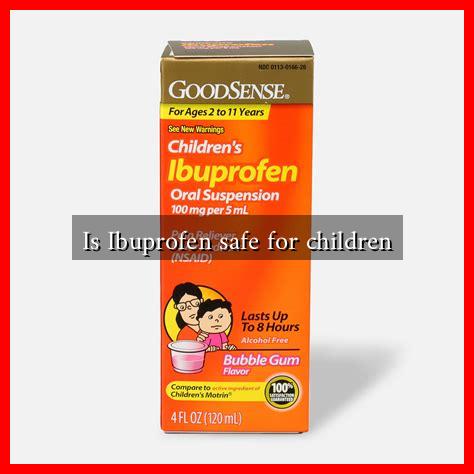-
Table of Contents
Is Ibuprofen Safe for Children?
Ibuprofen is a widely used nonsteroidal anti-inflammatory drug (NSAID) that is often recommended for pain relief and fever reduction in children. However, parents frequently question its safety and appropriate usage. This article aims to provide a comprehensive overview of ibuprofen’s safety profile for children, including its benefits, potential risks, and guidelines for use.
Understanding Ibuprofen
Ibuprofen works by inhibiting enzymes involved in the production of prostaglandins, which are chemicals in the body that promote inflammation, pain, and fever. It is available over-the-counter in various forms, including liquid suspensions, chewable tablets, and standard tablets. Common brand names include Advil and Motrin.
Benefits of Ibuprofen for Children
Ibuprofen is often recommended for children due to its effectiveness in managing various conditions. Some of the key benefits include:
- Pain Relief: Ibuprofen is effective in alleviating mild to moderate pain, such as headaches, toothaches, and muscle aches.
- Fever Reduction: It is commonly used to lower fever in children, especially during illnesses like the flu or common cold.
- Anti-inflammatory Properties: Ibuprofen can help reduce inflammation associated with conditions like arthritis.
Safety Considerations
While ibuprofen is generally considered safe for children when used appropriately, there are important safety considerations to keep in mind:
- Age and Weight: Ibuprofen is typically safe for children over six months of age. Dosage is often determined by the child’s weight, so it is crucial to follow dosing guidelines provided by a healthcare professional or the product label.
- Medical Conditions: Children with certain medical conditions, such as kidney disease or gastrointestinal issues, may be at higher risk for adverse effects. Always consult a pediatrician if your child has underlying health concerns.
- Duration of Use: Ibuprofen should not be used for extended periods without medical supervision. Prolonged use can lead to gastrointestinal bleeding or kidney damage.
Potential Risks and Side Effects
Like any medication, ibuprofen can have side effects. Some common side effects include:
- Stomach upset or nausea
- Diarrhea or constipation
- Rash or allergic reactions
In rare cases, more severe side effects can occur, such as:
- Kidney damage
- Gastrointestinal bleeding
- Severe allergic reactions (anaphylaxis)
According to a study published in the Journal of Pediatric Pharmacology and Therapeutics, the incidence of serious adverse effects in children using ibuprofen is low when used according to recommended guidelines.
Guidelines for Safe Use
To ensure the safe use of ibuprofen in children, consider the following guidelines:
- Always read the label and follow dosing instructions carefully.
- Use the appropriate formulation for your child’s age and weight.
- Consult a healthcare professional if your child is taking other medications or has existing health issues.
- Monitor your child for any adverse reactions after administering ibuprofen.
Conclusion
In summary, ibuprofen can be a safe and effective option for managing pain and fever in children when used appropriately. Parents should adhere to dosing guidelines, consider their child’s medical history, and consult healthcare professionals when in doubt. While the risks associated with ibuprofen are generally low, awareness and caution are essential to ensure the well-being of your child. Always prioritize safety and consult a pediatrician for personalized advice.

